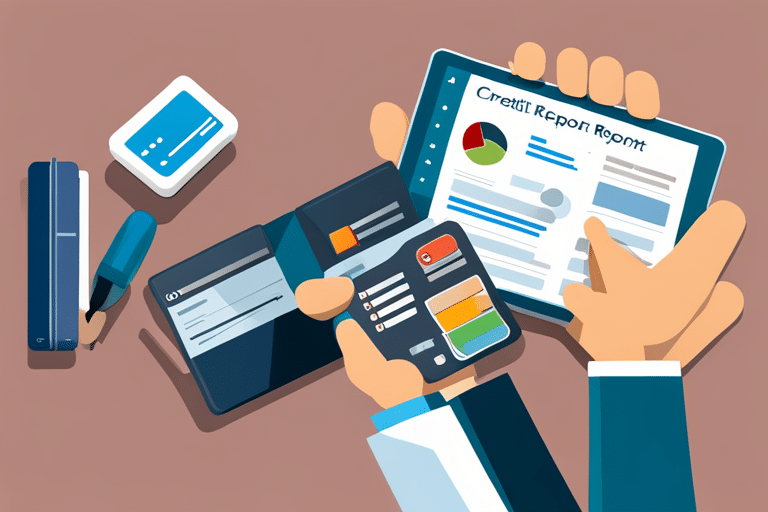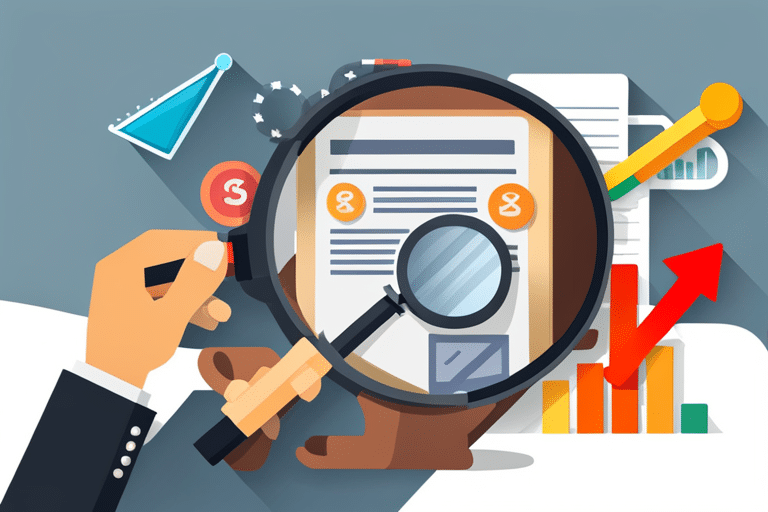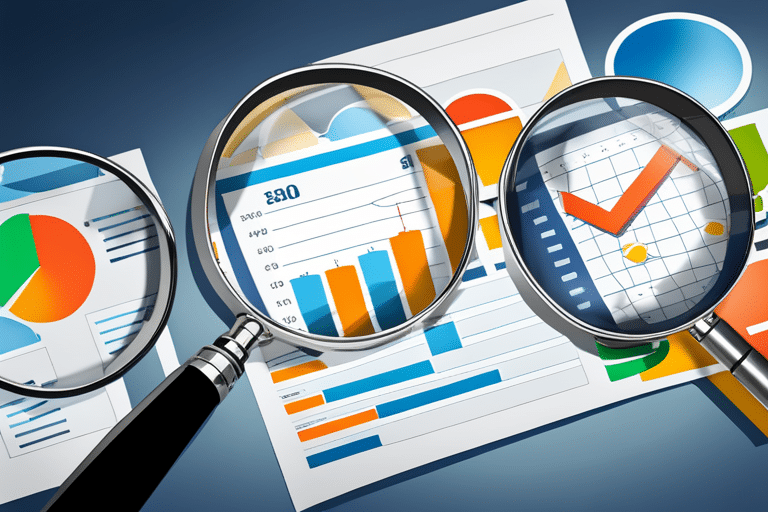Are you ready to take control of your financial future? Ever wondered what secrets your credit report holds? Look no further!
In ‘The Ultimate Guide to Understanding Your Credit Report,’ we’ll unravel the mysteries and empower you with the knowledge you need. Discover how checking your credit report regularly can safeguard your financial well-being.
Learn how to obtain a copy, decipher its sections, and calculate credit scores. Don’t let negative information hold you back – take steps to improve and maintain a healthy credit report today!
Key Takeaways
- Regularly checking your credit report helps detect errors or fraudulent activity.
- Understanding your credit report gives insight into how lenders view you as a borrower.
- Taking steps to improve and maintain a healthy credit report is important for financial health.
- Factors affecting credit scores include credit utilization ratio, payment history, length of credit history, types of credit used, and credit inquiries.
The Importance of Checking Your Credit Report Regularly

You should make sure you’re regularly checking your credit report to stay on top of any potential errors or fraudulent activity. Think of it as peeking into a treasure chest filled with information about your financial history. By keeping an eye on your credit report, you can uncover any hidden gems that might be affecting your creditworthiness.
Credit monitoring is like having a trusty compass guiding you through the murky waters of the financial world. It allows you to spot any inaccuracies or discrepancies that could harm your credit score and, ultimately, your financial future. Regularly reviewing your credit report gives you the power to correct these mistakes and protect yourself from identity theft or fraud.
But why stop there? The benefits of reviewing your credit report regularly extend beyond just error detection. Like an adventurer exploring uncharted territory, you gain insight into how lenders view you as a borrower. You can see what factors are positively influencing your credit score and which areas could use some improvement.
By understanding the importance of credit monitoring and taking action to review your report regularly, you become the master of your financial fate. You have the opportunity to make informed decisions about loans, mortgages, and other important financial matters.
What Information Is Included in Your Credit Report

Included in your credit report are details about your payment history, current debts, and any public records such as bankruptcies or tax liens. It’s like a secret diary of your financial life, except it’s not really a secret because lenders can peek at it whenever they want. But hey, no worries! Understanding what’s in that report is key to maintaining good financial health.
So let’s dive in and take a look at some common credit report mistakes you should watch out for.
First off, keep an eye on your payment history. Late payments can wreak havoc on your credit score faster than an ice cream melting on a hot summer day. Make sure all those bill due dates are circled on your calendar so you never miss another one again!
Next up, current debts. Too much debt can be overwhelming, like trying to juggle flaming torches while riding a unicycle (not recommended). Keep track of your balances and try to pay them down as quickly as possible. Your future self will thank you for it.
Now let’s talk about those pesky public records. Bankruptcies and tax liens may sound scary, but don’t worry too much if they’re not part of your financial story. Just make sure that the information reported is accurate and up-to-date.
Monitoring your credit history is crucial because it allows you to catch errors or fraudulent activity before they cause major damage. Now that you know why it’s important, let’s move on to the next step: how to obtain a copy of your credit report…
How to Obtain a Copy of Your Credit Report

To get a copy of your credit report, you can request it from the three major credit bureaus: Equifax, Experian, and TransUnion. These agencies are like the guardians of your financial life, keeping track of all your credit activities and providing you with a snapshot of your creditworthiness.
Here’s how you can obtain that valuable piece of information:
-
Reach out to each credit bureau individually: Imagine yourself dialing their numbers or sending them an email one by one. The anticipation builds as you wait for someone to answer or respond to your request.
-
Provide the necessary information: Picture yourself confidently stating your name, address, and social security number over the phone or typing it into an online form. You feel a sense of power knowing that this is your ticket to unlocking the secrets within your credit report.
-
Wait eagerly for their response: Now imagine yourself anxiously waiting for the email notification or mail delivery containing your precious credit report. It’s like waiting for a long-lost friend to finally show up on your doorstep after years apart.
Once you have obtained your credit report, take some time to carefully review it for any errors or discrepancies. If you find any inaccuracies, don’t fret! These things happen sometimes. Just reach out to the respective credit bureaus and follow their instructions for disputing errors.
Understanding the Different Sections of Your Credit Report

The different sections of your credit report can provide important insights into your financial history and creditworthiness. Think of it as a map that reveals the hidden treasures and pitfalls in your financial journey. So, let’s embark on this adventure together and decode the secrets of your credit report!
First up, we have the personal information section. This is where you’ll find details like your name, address, and social security number. It may not seem exciting, but it’s crucial to ensure all the information is accurate. After all, you wouldn’t want someone else’s mistakes tarnishing your reputation!
Next, we come across the credit account section. Here, you’ll discover a treasure trove of information about your loans, credit cards, and other forms of borrowing. Pay close attention to any late payments or delinquencies lurking in this section – they could weigh down your creditworthiness.
Moving along our map, we reach the public records section. This is where potential landmines such as bankruptcies or tax liens might be hiding. Keep an eye out for any explosions that could harm your financial standing.
Lastly, we stumble upon the inquiries section – a collection of footprints left by lenders who’ve checked out your credit history. Too many footprints can raise red flags among future lenders.
Understanding these different sections is essential for interpreting your credit report accurately. Armed with this knowledge, you’re ready to navigate through the treacherous waters of how credit scores are calculated.
How Credit Scores Are Calculated

So, you want to know how those mysterious credit scores are calculated. Well, buckle up because we’re about to dive into the wild world of factors affecting credit scores!
First up, let’s talk about the credit utilization ratio – that fancy term for how much of your available credit you’re actually using.
Then, we’ll explore the importance of payment history and how it can make or break your score.
Get ready to unravel the secrets behind those three little numbers that hold so much power over your financial life!
Factors Affecting Credit Scores
Understanding the factors that affect your credit score can help you make informed decisions to improve it. Your credit utilization, or the amount of credit you use compared to your total available credit, is like a seesaw – too much debt and your score can plummet, but using a small portion of your available credit can boost it up.
Credit scoring models, like magical wizards, take into account not only how much debt you have, but also your payment history and length of credit history. Think of these models as wise old sages who evaluate every detail to determine your creditworthiness.
As we delve further into the world of credit scores, let’s first explore the importance of understanding your credit utilization ratio.
Now that you understand some key factors affecting your credit score such as credit utilization and credit scoring models.
Credit Utilization Ratio
Your credit utilization ratio is the percentage of your available credit that you are currently using. It’s like a dance between how much credit you have and how much of it you’re actually using. Think of it as the tango of your financial life – too much utilization and your score takes a dip, too little and it might not make an impression. To help you understand this concept better, here’s a handy table that breaks down the impact of different credit utilization ratios on your credit score:
| Credit Utilization Ratio | Impact on Credit Score |
|---|---|
| Less than 10% | Excellent |
| 10-30% | Good |
| 30-50% | Fair |
| Above 50% | Poor |
Now that you know how important your credit utilization ratio is, let’s dive into some tips to improve it! Remember, mastering this will help keep your financial tango in perfect harmony.
Payment History Importance
Now that you understand the importance of your credit utilization ratio, let’s dive into another crucial aspect of your credit report: your payment history.
Your payment history is like a mirror reflecting how responsible you are when it comes to paying off your debts. It shows lenders whether you consistently make payments on time or if you have any delinquencies.
Here are three key reasons why payment history is vital:
-
Creditworthiness: A strong payment history demonstrates to lenders that you are reliable and trustworthy.
-
Interest Rates: A positive payment history can lead to lower interest rates on loans and credit cards.
-
Future Opportunities: Maintaining a good payment history opens doors for better financial opportunities in the future.
However, keep in mind that credit report errors can occur, leading to inaccurate information about your payment history. In the next section, we’ll discuss common errors to look for on your credit report and how to dispute them effectively.
Common Errors to Look for on Your Credit Report

Hey there, credit aficionado!
Today, let’s dive into the exciting world of common errors on your credit report and how they can impact you.
We’ll explore the thrilling consequences of reporting errors and how you can dispute inaccurate information like a true credit superhero.
Impact of Reporting Errors
It’s important to be aware of the impact that reporting errors can have on your credit report. These errors can affect your financial life in ways you may not even imagine.
Here are three scenarios to help you understand the gravity of reporting mistakes:
-
Imagine applying for a mortgage and getting rejected because of an error on your credit report. Your dream home slips through your fingers, all because of a simple mistake.
-
Picture yourself trying to secure a loan for a new car, only to be denied due to an incorrect negative mark on your credit report. You’re left without wheels, feeling frustrated and helpless.
-
Now envision being turned down for a job because an employer saw false information on your credit report. It’s unfair and damaging to your professional reputation.
Knowing the dispute process and understanding your legal rights is essential when it comes to correcting these errors and protecting yourself from their harmful consequences. Stay informed and take action to ensure the accuracy of your credit report!
Disputing Inaccurate Information
To dispute inaccurate information, you should start by reviewing your credit report for any errors or discrepancies. Don’t worry, this process is like a detective game where you get to be the Sherlock Holmes of your own finances!
First, gather all the necessary documents and take a deep dive into your credit report. Look out for any mysterious charges or unfamiliar accounts that could be dragging down your credit score.
Once you’ve identified the inaccuracies, it’s time to take action! Follow these steps to dispute:
1) Write a letter explaining the error with supporting evidence;
2) Send it via certified mail to both the credit bureau and the information provider;
3) Keep copies of everything for your records.
Remember, you have legal rights when it comes to disputing incorrect information on your credit report.
Now that we’ve cleared up how to dispute inaccuracies, let’s dive into how negative information impacts your credit report…
How Negative Information Impacts Your Credit Report

Negative information can significantly impact your credit report and potentially lower your credit score. It’s like a dark cloud looming over your financial reputation, raining down consequences that can make it harder for you to secure loans or get approved for credit cards.
So, let’s take a closer look at how these negative marks can affect your credit report:
-
Effect of late payments: Picture this – you’re walking on a tightrope of financial responsibility, carefully balancing all your bills and due dates. But then, life throws you a curveball and one payment slips through the cracks. Suddenly, that tightrope starts to wobble, and before you know it, your credit score takes a nosedive.
-
Impact of bankruptcy: Imagine stepping into a courtroom where the judge slams down their gavel with an echoing thud – bankruptcy declared! Your financial world turns upside down as creditors line up, ready to devour any remaining scraps from the wreckage. And just like that, the stain of bankruptcy is etched onto your credit report for years to come.
-
Collection accounts haunting you: Close your eyes and imagine being chased by ghosts – not just any ghosts but relentless collection agents hounding you day in and day out. These phantom debts latch onto your credit report like chains weighing you down, making it difficult to escape their clutches.
Now that we’ve explored the gloomy impact of negative information on your credit report, don’t fret! There are steps you can take to improve this situation and reclaim control over your financial destiny…
Steps to Take to Improve Your Credit Report

Ready to take action and improve your credit report? It’s time to dive into the exciting world of credit scores! Don’t worry, it’s not as intimidating as it sounds. With a few simple steps, you’ll be well on your way to improving your credit score and opening doors to financial opportunities.
First things first, start by checking your credit report regularly. This is an important step because it allows you to identify any errors or discrepancies that could be dragging down your score. Plus, keeping tabs on your report gives you a sense of control over your financial destiny!
Once you have a clear picture of where you stand, it’s time to tackle those negative items head-on. Begin by paying off any outstanding debts or collections. Not only will this help improve your score, but it will also give you some peace of mind knowing that you’re taking charge of your finances.
Next up, make sure you’re using credit responsibly. That means paying bills on time (never let them slide!), keeping balances low on credit cards, and avoiding new debt whenever possible. Think of yourself as a superhero protecting the sanctity of your credit score!
Finally, consider seeking professional help if necessary. Credit counseling services can provide valuable guidance and advice tailored specifically to your situation. They can help create a personalized plan for improving your credit and getting back on track financially.
Strategies for Disputing Inaccurate Information on Your Credit Report

So, you’re ready to tackle those disputed credit items head-on and set the record straight? Well, my friend, you’ve come to the right place!
In this discussion, we’ll explore some savvy strategies for validating those pesky disputed credit items, gathering all the supporting documentation like a pro, and even reaching out to those credit reporting agencies to make sure your case is heard loud and clear.
Buckle up because we’re about to dive into a world of credit report wizardry!
Validating Disputed Credit Items
When you’re trying to validate disputed credit items, it’s important to gather all the necessary documentation. Think of it as embarking on a grand detective mission, where you hold the key to unlocking the truth behind those pesky inaccuracies on your credit report.
So grab your magnifying glass, put on your thinking cap, and follow these steps:
-
Investigate: Dive deep into your credit report and identify the disputed items that need validation. They might be lurking in plain sight or cleverly hidden in the shadows.
-
Collect Evidence: Gather all the supporting documents that can prove your case. Bank statements, receipts, correspondence—anything that showcases your innocence should be included.
-
Submit Your Case: Present this compelling evidence to the credit bureaus like a legal mastermind building an air-tight argument. Be confident in your submission and let them witness firsthand the strength of your case.
Providing Supporting Documentation
Gather all the necessary documentation to support your case and provide a strong foundation for validating disputed credit items. Think of it as gathering a team of superheroes, each armed with their own superpower: supporting evidence.
These documents are like the capes and masks that will protect you from credit villains. They hold immense importance in your quest for financial mastery.
Imagine entering the battlefield armed with nothing but words. Your opponents, the credit bureaus, would surely overpower you. But fear not! With proper documentation, you have the power to fight back.
When providing supporting evidence, make sure to gather statements, receipts, and any other relevant paperwork that can prove your case. These pieces of evidence will serve as your shield against false accusations and errors on your credit report.
Contacting Credit Reporting Agencies
Contact the credit reporting agencies to dispute any errors on your report and ensure that they are promptly corrected.
Here’s how you can do it:
-
Grab your phone and dial the credit reporting agency contact information hotline, like a secret agent uncovering hidden truths.
-
Speak with confidence as you explain the errors on your report, like a master detective presenting evidence in court.
-
Provide all necessary documentation and information, giving the credit reporting agencies no choice but to take action.
If you’re not satisfied with their response, don’t fret! You can file a complaint with the credit reporting agencies to escalate the matter further. Be persistent and determined, showing them that you won’t back down until justice is served.
Long-Term Benefits of Maintaining a Healthy Credit Report

You can reap long-term benefits by maintaining a healthy credit report. Your credit report is like a magical crystal ball that lenders use to determine whether you’re worthy of their trust and financial offerings. Think of it as your financial resume – the better it looks, the more opportunities you’ll have for loans, mortgages, and better interest rates. So, let’s dive into some credit building strategies that will help you unlock the secrets to a healthy credit report.
| Credit Building Strategies | Long-Term Benefits |
|---|---|
| Pay your bills on time | Qualify for lower interest rates |
| Keep your credit utilization low | Increase your chances of loan approval |
| Maintain a diverse mix of credit accounts | Build a solid financial foundation |
| Regularly review and dispute any errors on your report | Protect yourself from identity theft |
By paying your bills on time, you not only avoid late fees but also show lenders that you are responsible with your finances. This simple act can lead to long-term benefits such as qualifying for lower interest rates on loans or even securing that dream home at a more affordable price.
Keeping your credit utilization low is another key strategy in maintaining a healthy credit report. This means using only a small portion of the available credit on your cards. By doing so, you demonstrate restraint and financial discipline which can increase your chances of loan approval in the future.
Maintaining a diverse mix of credit accounts is like having an all-star team backing up your financial reputation. Lenders love seeing different types of accounts such as mortgages, car loans, and credit cards because it shows them that you can handle different types of debt responsibly.
Lastly, regularly reviewing and disputing any errors on your credit report is crucial in protecting yourself from identity theft and ensuring accurate information gets reported. A clean and error-free report gives lenders confidence in lending to you.
Frequently Asked Questions
Can I Check My Credit Report for Free?
Sure, you can totally check your credit report for free! It’s important to review it regularly and dispute any errors you find. Don’t worry, checking your report won’t affect your credit score.
How Often Should I Check My Credit Report?
You should check your credit report regularly to stay on top of your financial health. It’s important because it helps you catch any errors or fraudulent activity and allows you to maintain a good credit score.
Will Checking My Credit Report Too Frequently Affect My Credit Score?
Checking your credit report too often won’t harm your credit score. In fact, monitoring it regularly has many benefits like catching errors and detecting identity theft early. So go ahead and keep tabs on your financial well-being!
How Long Does Negative Information Stay on My Credit Report?
Negative information can stay on your credit report for up to seven years. But don’t fret! If you find any inaccuracies, dispute them ASAP. Remember, these blemishes can impact your credit score, so stay on top of it!
Can I Remove Negative Information From My Credit Report?
Yes, you can remove negative information from your credit report. By disputing errors and working on improving your credit habits, you can have a positive impact on your credit score. So don’t worry, there’s hope!
Conclusion
Congratulations! You’ve reached the end of our ultimate guide to understanding your credit report.
Now that you’re armed with all this valuable information, you can confidently navigate the world of credit and make informed decisions.
Remember, keeping an eye on your credit report is like nurturing a beautiful garden – it takes time and effort but yields amazing results.
So go forth, my friend, and cultivate a healthy credit report that blossoms with financial opportunities!

